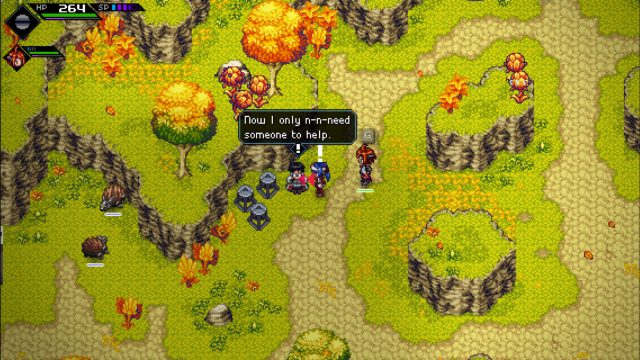

I’m not exaggerating when I say this game brought back a rush of nostalgia through its hugely idealised version of mid 00’s gaming culture. In CrossCode, a game set within a fictional MMO, the design ethos is to fulfil that promise. I mentioned before that the popular strategy of most MMO’s was to promise the player the possibility of awesome adventures (after grinding or payment). I guess what I’m trying to say is that I’m in the very specific target demographic for Radical Fish Games’ CrossCode – and if you relate at all to my experiences, then this is going to be one of the most satisfying gaming experiences you’ll have this year. It’s just not possible to get that kind of experience online anymore, not since MOBAs capitalised on the free-to-play market, and not since smartphones have become to the go-to platform for microtransaction-fuelled exp-grinds. Of the MMORPG’s that I even remember the names of, they are either defunct, propped up by a devoted skeleton playerbase in the double digits, or watered down and overhauled like Runescape or Maplestory.

It was a promise that with enough time invested, if you invited enough friends, and if you managed to drop a few dollars on those microtransactions, you’d also have the awesome adventures that you were always seeing around you.įor better or for worse, most of those promises turned out to be hollow. What made these games so compelling wasn’t the grind itself, but the promise you got to see other players in powerful-looking armour running about an enormous world, braving areas with monsters so dangerous you wouldn’t dare set foot in alone. But for the teenager with too much time on their spare hands, these games offered a grind that would make the school holidays melt away. Most were esoteric, grind-heavy and technically free-to-play, propped up by draconian Premium Currency models that gatekept overpowered in-game loot. It’s farfetched to consider based on the relative unpopularity of the genre today, but in the 2000’s, MMORPGs were everywhere. It’s not a proud segment of my life, but in the early to mid-2000’s I was a kid with a computer and Internet access, but no money to feasibly buy games for myself.


 0 kommentar(er)
0 kommentar(er)
